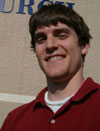14 May Three Leadership Development Events
We need to step up leadership development, because there is a dearth of recognizable leadership across our denomination. With that in mind, three events are occurring during a three-week period. Two have already happened. The third started today.
1. Hit the Bullseye Conference (Lima, Ohio). We brought all of our cluster leaders to this two-day conference April 29-30. We registered 35 people through our office, and several other UBs came on their own.
2. Drive Conference (Atlanta, Ga.). For the second year, we took a group of pastors of our largest churches to the Drive Conference, hosted by Andy Stanley’s church in Georgia.
3. Train the Trainer (Huntington, Ind.). Tim Elmore, who has been associated with John Maxwell for a long time, has his own leadership development organization. He recrafted material which he uses in the business world. We invited 20 people to take part in this event:
- Howard Beaver (Mount Olivet UB, Chambersburg, Pa.)
- John Beukema (King Street Church, Chambersburg, Pa.)
- Darrel Bosworth (Kilpatrick UB, Woodland, Mich.)
- Kelly Burnside (Gaines UB, Caledonia, Mich.)
- Mike Caley (Banner of Christ, Byron Center, Mich.)
- Owen Gordon (Jamaica Bible College, Jamaica)
- John Cole (Northland UB, Traverse City, Mich.)
- Gary Dilley (College Park Church, Huntington, Ind.)
- Milton Herrold (Orrstown UB, Orrstown, Pa.)
- Gordon Kettel (church planter, Grand Ledge, Mich.)
- Kent Koteskey (Emmanuel UB, Fort Wayne, Ind.)
- Chris Little (Mount Pleasant, Chambersburg, Pa.)
- Michael Longfellow (New Life, Chanute, Kansas)
- Marty Pennington (Mainstreet Church, Walbridge, Ohio)
- Greg Reed (Morning Star, Kokomo, Ind.)
- Pat Daugherty (Atlantic Avenue UB, Franklin, Pa.).
- Winston Smith (superintendent, Jamaica Conference)
- Phil Whipple (Colwood UB, Caro, Mich.)
- Ray Seilhamer (New Hope Church, Huntington, Ind.)
- Larry Vander Laan (Gaines UB, Caledonia, Mich.)

 Kyle Brenneman (right), a senior worship leadership major at Huntington University, has received the first Award of Distinction in Christian Worship from The Robert E. Webber Institute of Worship Studies. Kyle, from Spencerville, Ohio, is the grandson of Howard and Sue Cherry, who are well-known in the United Brethren church for their service in the pastorate, at Huntington University, and at the United Brethren national office.
Kyle Brenneman (right), a senior worship leadership major at Huntington University, has received the first Award of Distinction in Christian Worship from The Robert E. Webber Institute of Worship Studies. Kyle, from Spencerville, Ohio, is the grandson of Howard and Sue Cherry, who are well-known in the United Brethren church for their service in the pastorate, at Huntington University, and at the United Brethren national office. Melisssa Kline sent this note from Macau:
Melisssa Kline sent this note from Macau: